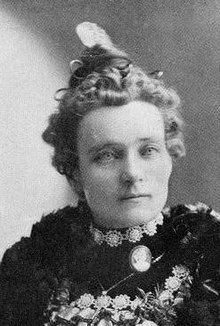Idael Makeever
Idael Makeever | |
|---|---|
 Idael Makeever, from a 1902 publication. | |
| Born | December 7, 1867 Porter County, Indiana, U.S. |
| Died | August 23, 1954 (aged 86) Loveland, Colorado, U.S. |
| Nationality | American |
| Other names | Ida E. Childers, Ida Makeever |
| Occupations |
|
Idael Childers Makeever (December 7, 1867 – August 23, 1954) was an American poet, songwriter, journalist and clubwoman.
Early life[edit]
Idael Childers was born in 1867, in Porter County, Indiana,[1][2] and educated in Valparaiso, the daughter of George Childers and Tryphena Ida Childers. Her father was a businessman, and her mother was born in Canada.[3] After she was married and had two children in Nebraska, she returned to Indiana to take courses at Valparaiso University.[4]
Career[edit]
Makeever taught school in Indiana for several years as a young woman.[3] She published two books of her poetry: Prairie Flowers and Meadow Grasses (1889) and Golden Rod and Dialect Poems (1898).[1] She read her poem "Nebraska" at the Trans-Mississippi Exposition in Omaha, in 1898.[1] Makeever's poem "I'm Going Home" was included in a 1902 collection of Indiana writers' works.[5] "She took up the unsung themes of the West," commented one profile in 1902.[4] "In the broad prairies," noted another, "her poetic nature blossomed and flowered, and the notes of her songs mingled with the music of the meadowlark."[6] Makeever was an active member of the Western Association of Writers.[7][8]
Makeever also wrote song lyrics, including "The Dream Face" (1909, music by Blanche M. Tice).[9] During World War I, she worked as a reporter for Omaha newspapers. During World War II, she was a newspaper columnist in Colorado, and worked at Hill Air Force Base in Utah.[10]
Personal life[edit]
Idael Makeever married lawyer and mining executive Milton Alexander Makeever in 1889; with him, she moved to Stromsburg, Nebraska, where their two daughters, Merle and Iva Lee, were born in 1889 and 1894.[3] She moved to Boulder, Colorado in 1902,[1] while her husband was working at a gold mine in Mexico.[3] She was widowed in 1940, and she died in 1954, aged 86 years, in Loveland, Colorado.[11] Her papers are archived at Valparaiso University in Indiana.[3]
References[edit]
- ^ a b c d "Idael Makeever". Nebraska Authors. Retrieved 2019-10-14.
- ^ History of Porter County, Indiana: A Narrative Account of Its Historical Progress, Its People and Its Principal Interests. Lewis Publishing Company. 1912. pp. 257.
Idael Makeever.
- ^ a b c d e Sharon Meyer, Cobie Ball, and Madeline Sheldon, Finding aid for Idael Makeever Collection, 1888-1986 (Valparaiso University Archives & Special Collections).
- ^ a b "Western Women Writers". The Saint Paul Globe. July 19, 1902. p. 7. Retrieved October 14, 2019 – via Newspapers.com.
- ^ Hamilton, Edward Joseph. Indiana Writers of Poems and Prose (Chicago: Western Press Association 1902): 130-131. via Internet Archive.
- ^ "Pen and Picture Pointers". Omaha Daily Bee. August 31, 1902. p. 22. Retrieved October 14, 2019 – via Newspapers.com.
- ^ "The Last Joke Cracked". Indianapolis Journal. July 1, 1899. p. 2. Retrieved October 14, 2019 – via Hoosier Chronicles.
- ^ "Western Association of Writers to Meet". Indianapolis News. June 3, 1902. p. 14. Retrieved October 14, 2019 – via Hoosier Chronicles.
- ^ Catalog of Copyright Entries: Musical compositions. Library of Congress, Copyright Office. 1909. p. 600.
- ^ "HF Employe Has Seen Three Wars". The Hill Top Times. November 29, 1944. p. 5. Retrieved October 14, 2019 – via Newspapers.com.
- ^ "Obituary: Mrs. Idael Makeever". Stromsburg Headlight. September 2, 1954. p. 1. Retrieved October 14, 2019 – via NewspaperArchive.com.
External links[edit]
- 1867 births
- 1954 deaths
- People from Porter County, Indiana
- People from Stromsburg, Nebraska
- American women in World War I
- American women civilians in World War II
- Valparaiso University people
- American women poets
- Poets from Nebraska
- Songwriters from Nebraska
- Songwriters from Indiana
- 20th-century American women writers
- 19th-century American poets
- 20th-century American poets
- American women columnists
- 19th-century American journalists
- 20th-century American journalists
- Journalists from Indiana
- Journalists from Nebraska
- Poets from Indiana
- American people of Canadian descent
- 19th-century American women journalists
